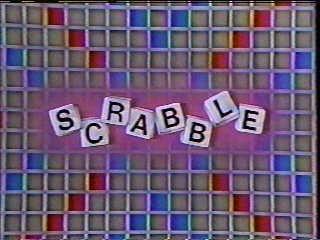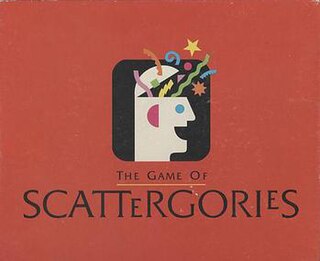Clabbers is a game played by tournament Scrabble players for fun, or occasionally at Scrabble variant tournaments. The name derives from the fact that the words CLABBERS and SCRABBLE form an anagram pair.

Scrabble is a word game in which two to four players score points by placing tiles, each bearing a single letter, onto a game board divided into a 15×15 grid of squares. The tiles must form words that, in crossword fashion, read left to right in rows or downward in columns and are included in a standard dictionary or lexicon.

Upwords is a board game. It was originally manufactured and marketed by the Milton Bradley Company, then a division of Hasbro. It has been marketed under its own name and also as Scrabble Upwords in the United States and Canada, and Topwords, Crucimaster, Betutorony, Palabras Arriba and Stapelwoord in other countries. It is currently available as a board game and a digital gaming app.

Anagrams is a tile-based word game that involves rearranging letter tiles to form words.

Boggle is a word game in which players try to find as many words as they can from a grid of lettered dice, within a set time limit. It was invented by Allan Turoff and originally distributed by Parker Brothers.

Scrabble is an American television game show based upon the board game Scrabble. Contestants competed in a series of rounds to fill in words within a crossword puzzle for cash. Muriel Green of Exposure Unlimited developed the idea for a television game show based upon the board game concept. During 1983, Green convinced Selchow and Righter, who at that time owned the Scrabble board game, to license Exposure Unlimited to produce the game show. Exposure Unlimited co-produced the show with Reg Grundy Productions, and licensed the show to NBC. Scrabble aired on NBC from July 2, 1984, to March 23, 1990, and again from January 18 to June 11, 1993. Chuck Woolery hosted the program. Jay Stewart was the announcer for the first year. Charlie Tuna replaced him in mid-1985 and remained through the original run and the entirety of the 1993 revival.

Super Scrabble is a board game introduced in 2004 and a variant of Scrabble. It is played on a 21×21 grid board instead of Scrabble's usual 15×15, and uses twice as many letter tiles.
Scrabble variants are games created by changing the normal Scrabble rules or equipment.

Scattergories is a creative-thinking category-based party game originally published by Milton Bradley in 1988. The objective of the 2-to-6-player game is to score points by uniquely naming objects within a set of categories, given an initial letter, within a time limit. The game is based on a traditional game called "Categories".

Francophone Scrabble is Scrabble in the French language. The governing body, the Fédération internationale de Scrabble francophone, has more than 20,000 members. Just as in English, points are scored by playing valid words from the lettered tiles. In French there are 102 tiles - 100 lettered tiles and two blanks known as jokers. The official word list for Francophone Scrabble is L'Officiel du jeu Scrabble.
Bingo is a term used in North American Scrabble for a play in which a player puts seven tiles on the board in a single turn. Mattel, the game's manufacturer outside North America, uses the term bonus to describe such a word. In French, it is called a scrabble. A player who does this receives a 50-point bonus, which is applied after the rest of the play is scored.

Tile tracking is a technique most commonly associated with Scrabble and similar word games. It refers to the practice of keeping track of letters played on the game board, typically by crossing letters off a score sheet or tracking grid as the tiles are played. Tracking tiles can be an important aid to strategy, especially during the endgame when there are no tiles left to draw, where careful tracking allows each player to deduce the remaining unseen letters on the opponent's final rack. The marking off of each letter from a pre-printed tracking grid as the tiles are played is a standard feature of tournament play.

Kings Cribbage is a board game released by Cococo Games in 1997 that is a portmanteau-style game, scoring like cribbage but played similar to Scrabble.

Duplicate Scrabble is a variant of Scrabble where all the players are faced with the same board and letters at the same time and must play the highest scoring word they can find. Although duplicate is rarely played at competition level in the United States, it is the most popular form of the game in Europe, most notably in France, Romania and the Netherlands, and is also played in Canada. The largest European Scrabble festivals can attract over 2000 people and some individual tournaments can count over 1000 participants per game. Although not popular for competitions in the US, the computer game Scrabble 2005 contains a duplicate version allowing up to 16 players to play on the same board at once. It was also used on the UK TV game show TV Scrabble as one of the rounds.
English-language Scrabble is the original version of the popular word-based board game invented in 1938 by US architect Alfred Mosher Butts, who based the game on English letter distribution in The New York Times. The Scrabble variant most popular in English is standard match play, where two players compete over a series of games. Duplicate Scrabble is not popular in English, and High score Scrabble is no longer practised.

Bananagrams is a word game invented by Abraham Nathanson and Rena Nathanson of Cranston, Rhode Island, wherein lettered tiles are used to spell words.

Scrabble ME is a variation of the classic board game Scrabble, where each player plays on their own small board as it is opposed to all players playing on one main shared board. It was published by Winning Moves Games USA in 2008.

The Computer Edition of Scrabble, also known as Computer Scrabble is a computer version of the board game Scrabble, licensed from J. W. Spear & Sons and released by Little Genius for the Apple II in 1982. It was subsequently released for most home computers of the time.

Words with Friends is a multiplayer computer word game developed by Newtoy. Players take turns building words crossword-puzzle style in a manner similar to the classic board game Scrabble. The rules of the two games are similar, but Words with Friends is not associated with the Scrabble brand. Up to 40 games can be played simultaneously using push notifications to alert players when it is their turn. Players may look up friends either by username or through Facebook, or be randomly assigned an opponent through "Smart Match". Players can also find potential opponents using Community Match.

Scrabble Showdown is an American game show created for the American cable network The Hub. The program was based on the board game Scrabble and was hosted by Justin Willman. It ran from September 3, 2011, to April 15, 2012.















